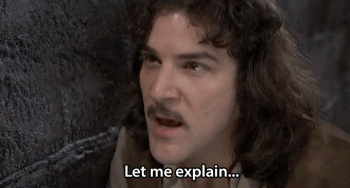Writing Advice is Bunk. Sort Of.

Good Aftermorneven,
In my last post, I spoke a little bit about one particular piece of writing advice, and made a small mention of writing advice in general. I have a small problem with writing advice, which is to say, I think that writing advice is bunk. Sort of. Let me explain.

When I was first starting out as a baby writer, and still very wide-eyed at the world of writing, publishing and all the ephemera that surrounds it, I was desperate for guidance. I latched on to anything anyone who had been in the business longer than I had to say. It wasn’t long at all before I noticed that one person would preach one thing as absolute gospel, and someone else would expound the virtues of the very opposite thing, and deny that any other action might work. For a while there, I was more lost that when I had first started on the writing journey. It was confusing, frustrating, and, frankly, alienating; particularly when what was recommended was absolutely antithetical to the way I work. This was compounded by the declaration of “You are not a real writer if… [insert favourite method].” Which, of course, is absolute nonsense.
Being much older, wiser or embittered (depending on the day), I can safely say that all writing advice is absolute bunk. Sort of. Listen, only the Sith deal in absolutes.
I’m going to go through a couple of pieces of writing advice that see most often, and why they’re nonsense as a general piece of advice. They might work for you or someone you know, but there are as many ways to be a writer as there are writers in the world. Let’s get on, shall we?

Write Everyday
No. Just… no. Look, this might be something good to strive for, but as a piece of writing advice that people should adhere to “or else,” it’s absolute annoying, ablest, elitist bull. If you are someone who has ample spare time and energy on your hands – you’re independently wealthy and don’t have to work one, two or several jobs in order to keep a roof over your head and food on your table, never mind if you’re the primary carer for children or other members of your family – by all means. Write every day. Good. Go you. That’s awesome.
However, claiming that someone is not a true writer if they don’t write everyday is absolute nonsense. Cut it out. This minute.
For the rest of us, though, it might be a goal but it’s perfectly fine if you don’t or can’t. You’re still a writer, FFS. Some of us are working several jobs and have very limited time. We might not be able to write everyday. Sometimes we’re just too busy. Or we’re just too exhausted. For those of us with a limited amount of spell slots (also called spoons), we might have exhausted our mana reserves. What we need to do in that case is rest and recharge, not stress that we didn’t get our daily word count. You’re still a writer if you didn’t sit down to your story today. Life happens to everyone who is alive.
Moreover, sometimes your brain needs to percolate. Lying still on the couch in the dark like a goblin letting your mind wander is writing, even if you don’t put pen to paper or fingers to keyboard.
This piece of advice needs a desperate change. Instead of write everyday, the best advice is simply: Write what you can, when you can.
(Please note that writing does take discipline, and there will be moments when judicial application of discipline will be necessary. But that is not each and every case. And you’re still a writer even if you get lazy every so often.)

Never Start Your Story With [Fill in the Blank]
Again… no. Some of the favourite fill in the blanks here include:
- Descriptions of the weather,
- Character waking up,
- Dream sequence,
- The middle of a battle…
There are a limitless supply of things people claim you should never open your story with. If you were to listen to them all, nothing would ever get written. I’ve always found that this piece of advice feels like someone read it in a book somewhere, and now dislikes whatever opening their railing against; not because it’s poorly done, but because someone else told them that it’s a bad way to start a story.
Write whatever you want to open your story. I will say, however, that while the content of the opening isn’t at issue here, its execution absolutely is. That is to say, it’s what you do with the scene that opens your story that is important. One of my all-time favourite fantasy series drops you in the middle of a battle on the first page, but it does it so well that the reader is compelled to continue reading even though they’re completely lost for the first 150 pages or so… or, at least, I was. It was still brilliantly done. I was absolutely enthralled.
The content of your opening doesn’t matter. What matters is what you do with it. Make it sing. Give it vicious hooks that dig into the reader’s mind in an unrelenting hold. Do that. Never mind the “rules” that someone else made up about what is and is not a good opener. Their personal preferences are not commandments.

Plotting is the Only Way
Oh… oh… let me tell you how this ‘advice’ makes my blood boil. Most of the time, when I encounter a plotter, they simply shake their heads bemusedly and express some variation of, ‘I don’t know how you manage to do it.’ Some, however, usually those straight from a course they’ve taken, will tell you point blank that unless you plot your books before you sit down to write, you’re doing it wrong and you’re not a real writer.

I have heard that exact sentiment spoken to my face by a real person. I did not slap them. Be proud of me.
Look, some people require a detailed plot in order to keep themselves moving forward and actually finishing a book. Good for them. Some people have a loose guideline for their major plot points, and that’s grand. Some people, like myself, really only need the main character(s) and the ending of the story and away they go. Some people just sit down and pour a story from the depths of their subconscious onto the page like some possessed scribe. Whatever way works for you, do that. You’re a real writer whatever way you do it.
For the record, when I first started out, I took this particular piece of advice to heart, and attempted to carefully plot my first book. When I sat down to write the thing, however, my story had other ideas. My insistence on sticking to the plot points I had jotted down made writing like wading through treacle. When I just let the story go where it wanted, the words poured forth like some obscure, arcane magic. I’ve since learnt to trust my weird little brain. After several completed manuscripts, many of which are published, I figure that it knows what it’s doing even if it’s not always obvious to me in the beginning.
So, no. Plotting a story is not the only way to get it completed. It might help, so give it a shot. You’re still a writer if it doesn’t, though. Don’t let anyone tell you otherwise.
These are just three of the plethora of writing tips and tricks that people love to disseminate as all-or-nothing gospel. There are tonnes of others. Sound off below on your favourite pieces of writing advice that are anything but for you; and bear in mind that simply because something worked for you or someone you know, it will not be so for everyone.
There are many paths up the mountain. What matters is that you’re climbing, not how you’re climbing.
When S.M. Carrière isn’t brutally killing your favorite characters, she spends her time teaching martial arts, live streaming video games, and cuddling her cat. In other words, she spends her time teaching others to kill, streaming her digital kills, and a cuddling furry murderer. Her most recent titles include Daughters of Britain, Skylark and Human.
Dickens started Bleak House with five thick paragraphs about fog. Pretty good book, as I recall.
Right?!
Very, very true. So much of the advice is situational, at best, and personalized to the giver rather than the recipient, at worst. Your perspective on “write everyday” is at once surprising and much more reasonable; time spent thinking *should* count as “writing,” given how often one hears of writer’s block breaking mid-shower or a story concept birthing itself in the wood shop.
My favorite bit of shake-fish/throttle-advisor advice is now the “it should be your favorite.” Second-favorite shake-fish advice (and the one I tend to fight people on) is “don’t head-hop.” Some people are adamant that there is never a reason to head-hop, and if a writer head-hops, the writing is automatically bad. But I grew up reading some very good fiction that head-hopped with abandon, find the practice followable as long as it is properly attributed, and have encountered plenty of scenes that slow down narrative tempo if they *don’t* head-hop. If I’m not head-hopping in my own brain while I’m writing, inevitably I’ll re-read and realize that some character expressed knowledge of something s/he shouldn’t be aware of, so scenes and plot lines have to be rewritten.
Oh yes! The head-hopping “advice.” I feel the exact same. I have also read brilliant books that head-hopped all the damned time. I never have a problem following what’s going on, and I never understood that advice.
That’s a good one.